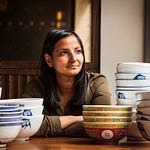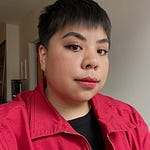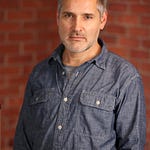In Episode 2, I talk to Helen Sproat, (Psychotherapist/Kundalini Yoga Teacher/Mind Foundation) about psychedelic assisted psychotherapy, tripping out on spicy curries and ask her what loneliness really is... This episode is published alongside a recipe for a spicy, vegetarian coconut curry.
Here's some more information about the various forms of psychedelic assisted psychotherapy available that you might enjoy, but please take all these things with a pinch of salt. Remember kids, taking psychedelic drugs is illegal and, as Helen says there's still much more to find out about these substances and practices, even if some of the research seems promising so far -
The Pyschedelic Drug Trial, BBC
Read more and support The Mind Foundation here, where Helen assists in running workshops.
I thought this was a pretty straightforward introduction as to what Kundalini yoga is.
And thought this VICE article about 'K'holing' after eating the spiciest chilli in the world was hilarious.
And, last but not least, listen to HELEN'S MARVELLOUS BEING ALONE PLAYLIST...
Episode Transcript: Helen Sproat interview with Julia Georgallis
Hello, welcome to the How to eat alone podcast, with me, Julia Georgallis. I’m a baker and I write about food.
This podcast celebrates the art of eating alone and in it I explore topics surrounding loneliness and aloneness. I’ll be talking to people from all walks of life about their own experiences of solitude and solo dining. With each episode, I’ll share a recipe which is designed to be cooked and eaten by one person and one person only, because I find that most recipes are written for two or more people. So if you do find yourself eating alone, you can cook along whilst listening to this podcast - think of me as your dining buddy.
So, I thought this episode was going to be about mushrooms. Specifically, the magic variety. I thought I was going to talk about mushroom trips and how they change our perspectives and maybe we were going to talk about mycology and possibly other substance induced spiritual rituals like Ayahuasca and Peyote ceremonies and then I was probably gonna shoehorn a mushroom risotto recipe or something in…
I thought this because I had totally assumed that I knew what Helen Sproat, my next guest for this episode, does for a living. Helen is from Yorkshire originally, she’s lived in London for a while and now lives in Lisbon, which is where I met her. She’s a psychotherapist, she’s just completed her Kundalini Yoga teacher training and, over the last year she’s been telling me about some new training that she’s been doing in Psychedelic Integration.
So I basically thought that psychedelic integration was when people took mushrooms with their therapists. I just want to be very clear and say that this is not what psychedelic integration is and I think I’d got the wrong end of the stick because there's been a lot in the media recently about the research being done that looks at how certain psychedelics could help mental health issues.
So Psychedelic Integration, contrary to what we see in documentaries and read about in articles, is still being really carefully researched. Some of these documentaries make it seem like psychedelic integration is something that is very much established but it’s actually not and we still don’t know very much about the brain and about these substances and about consciousness really.
Also, these drugs are still very illegal, kids, so let’s just be clear about that. It also turns out that, as we all knew deep down, there is no quick fix for mental ill health or solving your own problems, it isn’t as easy as taking a pill, tripping out for an hour and a half and boom, job done. We still have to do the work and usually we have to do this work on our own, we have to figure things out in our own minds.
Helen is all about doing this work and this episode is about doing this work and about going on these deep diving, healing journeys, often on our own, whether they’re induced by substance or not.
Helen’s been on a lot of difficult journeys and done a lot of interesting things. Even though her job description is quite varied, she’s a psychotherapist, she’s a yoga teacher and now she’s now part of this broader research, she does have one quite clear line of enquiry so I started by asking her how she pulls these interests together and how she became interested in the potential of psychedelics and altered states of consciousness.
HS - I think I’ve always been very interested in altered states of consciousness and sort of very interested in consciousness, it’s one of life’s biggest mysteries that we know very little about and my hunch is that we will never really fully know, one way or the other, what it’s all about, so it’s a fascinating topic for me and you know when we talk about altered states of consciousness we talk about things that can be induced by substance but also as human beings we have the ability to alter our consciousness without substance and reach some very unordinary states and as a psychotherapist I think sometimes psychotherapy can be bit like an altered state of consciousness. And yeah, you know, there’s a lot of research coming out at the moment of how altered states of consciousness can be very healing for people with certain problems so just sort of a natural progression from being curious about human beings really.
I facilitate workshops with an organisation called The Mind Foundation so there’s no use of substance, we focus on psychedelic integration to help somebody process and make sense of the experiences that they have if they choose that as a path for their own wellbeing, healing, expanding, changing their mind, whatever you wanna call it so if people choose that as their journey, then I’m sort of here to help integrate.
JG - That’s really interesting because I think sometimes when you decide to go on that kind of journey either through psychedelics or whatever else, it is really personal and I always wondered what it would be like to let someone else in to that but actually to kind of have someone there who helps you do that still alone I think is actually really powerful.
HS - Yeah absolutely, I mean to help somebody to make sense of something that might be difficult to process alone despite having that experience on their own - I mean if you look at some of these rituals and where these things come from and originally always done in communities. You know, there should be some part of it that’s with others I think, where you have another person to, uh, bounce off I think.
JG - Helen when you talk about altered states of consciousness, what’s the spectrum? Can it be something as small as daydreaming?
HS - Yeah I would think daydreaming is an altered state of consciousness. Uh, you could say an orgasm is an altered state of consciousness. And then you go through a big spectrum of all sorts of other things and through to sort of maybe what some people would say are more powerful altered states of consciousness and these are sort of usually things that are usually induced by substance.
JG - So like taking drugs to induce a trip or maybe getting drunk.
HS - Absolutely by taking a substance that will sort of alter to your state
JG - I see. So I suppose the interest in using psychedelics in psychiatry and psychotherapy isn’t anything new.
HS - Well, it went on originally in the 50s and what happened was they did lots of this investigation and it appeared that it was a very promising thing to move forward with so the governments backed using LSD as something that could be therapeutically helpful for people in terms of psychiatry and it got caught up in the subculture of the 60s, the hippy movement, the political state at that time and then very quickly went from something that was deemed as having potential to worst classification possible of a drug, and it seems like it was a political move at that time so there’s been a resurgence of the research and its showing promise again even though its very early stages so there’s been a sort of second wave of it, I guess.
JG - Why do you think there has been a second wave?
HS - I think there’s been a second wave because we see so many people suffering with depression anxieties, you know, it’s becoming more prevalent the more we progress in the modern world so I think really there’s been a resurgence because it’s necessary.
JG - Yeah, yeah for sure. I think we’re all being made quite aware that these mental illnesses like depression and anxiety are growing in prevalence and are being treated quite heavily with anti depressants and anti anxiety tablets - do you feel like with psychedelic assisted psychotherapy that could replace that kind of medication?
HS - I think from what they’re showing now is that there may be some promise with these substances and they may be less addictive and they may be less harmful and what the sort of early studies are showing and we don’t know so much about this at this stage is that it’s less of a lifelong solution. Many people will take antidepressants and really struggle to come off them, so really we have to let science work out what’s more effective and less harmful for people.
JG - Right. I see so it’s like less of a dependency on medication.
HS - I think really the other thing that’s very different is that when people are talking about psychedelic assisted psychotherapy the point being is it’s not outside of psychotherapy so they’re saying it’s not that you take this and this is something that you’ll be cured of all your ills, you take this with psychotherapy and this will assist the process of psychotherapy and I think for some people that might be very helpful and I think the research is very focused on certain areas so we can’t be getting too excited about this being a fix for everything.
JG - Yeah I mean I do feel from things that I’ve read, people are getting very excited about it.
HS - Yeah because you see in the Guardian or the BBC that this helps people with depression so therefore I’m gonna go and, er, dose myself up.
JG - I’m gonna go and TAKE SOME MUSHROOMS AND I’LL BE JUST FINE (laughs)
HS - Exactly and it’s really not and they’re stressing that it goes alongside psychotherapy and it's taken with professionals.
I think I’ve been very interested in this topic for some time but I’ve got more serious about it in the last year and I’m just really focused on the process of psychedelic integration or integration of any sort really, so I trained in order to facilitate workshops for people.
JG - So you had a totally different career before you became a psychotherapist. I wanted to know really why you had that career change?
HS - Yeah, so the sort of change to psychotherapy really came when I was diagnosed with cancer when I was 28 so that really was something that despite obviously being physically difficult, it was emotionally difficult and I think that’s what lead me into psychotherapy. Really it was the combination of that experience of trying to sort my own emotions out but then also everything that I wanted from life sort of became very different so what I was satisfied with before that event and what I was satisfied with after that event were really two different things so I think psychotherapy helped me work out my new way of being in the world after that experience. It was part of my own healing. I mean, they call psychotherapist wounded healers, I don’t know many psychotherapists who’ve glided through life.
JG - I mean I don't know how many people do just glide through life, psychotherapist or not…
HS - *She laughs*
Who are those people?
JG - Yeah who are they? Where are they and especially now with the pandemic, I think it’s touched everybody even if you were fine before.
HS - Absolutely, for some people this would have been, maybe one of their first shocks in their life or something that really challenged the way they see the world.
JG - For sure, and what about you, I mean how has the pandemic changed things for you?
HS - It’s been a year where I’ve learnt a lot about myself, I’ve spent a lot of time alone, before the pandemic I was quite good at being alone, but I think I’ve really really connected with myself over this past year in a way that I wasn’t doing before so yeah it’s not been a bed of roses but it’s been a very powerful learning journey I think.
JG - What kinds of things do you think you’ve done that have helped you be alone?
HS - I think the first lockdown, I was militant. I was doing my kundalini practice which is something that has really helped me to connect to myself, I was cold showers, I was walk every day - I think it was just something about control, then the second time I just let all that go out the window it was completely different, but I think I mentioned my kundalini practice - it’s really a practice that is about your inner experience.
JG - Could you elaborate a little bit more about what kundalini is?
HS - Yeah, so it’s a yoga and meditation but it differs from other yogas in that it’s more of a meditative practice so you’re really focusing, eyes closed all the time, using breath control and you’re sort of using the body to manipulate the breath and move energy around your body rather than a physical body practice. It’s a real cross over between a traditional meditation and sort of a traditional hatha yoga.
JG - I’ve done kundalini a few times - I think it’s one of those types of yogas that you have to really go into fully, I found it quite difficult actually, I found it very personal, I thought it was quite intimate in quite a lot of ways.
HS - There can be a lot that comes up. I’ve ended up doing a kundalini yoga teacher training, but you know when we’re talking about what happens in those states, it’s an altered state as well, there’s sometimes a lot that comes up and for people they need to process that.
JG - So we met in Lisbon and both of us, over the last few years have tried lots of different things, I guess a lot of those things were holistic. I feel like you’ve recommended women’s circles and that amazing Shiatsu massage guy and acupuncture - A lot of the time it’s been the case that you’ve told me about something so I’ve gone and done it!
HS - Like I’ve said I’ve tried lots of different things!
JG - I guess they are all a way to release whatever it is that you need to let go of.
HS - Letting go is very hard.
JG - Bloody hell, yeah. It really really is. And how has moving countries helped you let go? Has that helped in any way?
HS - Yeah, definitely. I left London and came to Lisbon and I think for me it helped me change, or maybe change isn’t the right word, I think I’d already changed and the structure around me was exactly the same so I think moving countries gave me a freedom to be the sort of newer version of myself that I already was but was sort of struggling a bit with the structure that was still as it was - does that make sense?
JG - Yeah like you had to kind of recalibrate a little bit.
HS - Yeah. And also you know I wanted a more balanced lifestyle, and to be healthier and more relaxed so I think those things also help you change or change back, I don’t really know which way it is.
JG - Yeah. You did all that on your own and it sounds like lots of the journeys that you have done are on your own.
HS - Yeah
JG - Is that a choice? Do you like doing things on your own? How do you relate to being by yourself?
HS - Very good question, is it a choice? Who knows? I think I am incredibly independent. And I think I have got more confident in doing things on my own as I’ve gotten older. And I think that it’s very empowering to know that you can go on whatever holiday you want to go on, you can go on whatever journey you want to go on. You don’t have to wait around for somebody to agree that that’s what they want to do as well. There’s a freedom in it. I don’t know if it’s been a choice I just think it’s been my pathway, I think, to do whatever I need to do.
JG - Are there bad bits to being alone?
HS - Yeah. I think actually and I think this is a personal thing, that I think loneliness is something that sort of I don’t know if it’s personal to me, but sort of felt a bit shameful - like you shouldn’t feel lonely. That would be the one thing about being on your own, you know, moments of loneliness, but do we get those same moments around other people too?
JG - Yeah, cos you can be lonely with other people. I think it’s interesting that you mention shame. Because I do think society puts forward a shame to being on your own. We’re not encouraged to do it.
HS - No but I wonder why. And I do think that it’s something that needs to be spoken about more. And celebrated, you know, it’s like it really is nice to hear, when I listened to the two other podcasts, to somebody else talking about it and it’s just like destigmatising the fact that people, and particularly women you know, they do the things that they want to do on their own and like… deal with it!
JG - Yeah! I mean both of us are in our thirties and neither of us are with anyone or have kids or whatever and I do think we have a bit of a harder time of it.
HS - Yeah, it’s like, normal people not being in relationships, you know!
JG - Yeah it just needs to be normalised. As a psychotherapist have you got the answer to what loneliness is? Do you know what it is, do you have to study what it is?
HS - No, I mean we don’t study what things are in that sense. Anything like that is a personal enquiry. We really learn how to attend to another person rather than deciding what things are and aren’t. So I think actually, quite the opposite, we’re taught we’re not assuming we know anything. If someone tells me that they’re lonely, I don’t think of loneliness from my viewpoint, I enquire about what loneliness is for that other person, so I don’t know what loneliness is in general.
JG - Well I mean I guess it’s a feeling and feelings are not tangible. They’re not explainable things. But we all know what loneliness is, that’s the thing.
HS - Well it is a common experience.
JG - We all have to kind of go through it I think, it’s a basic human experience, isn’t it, to feel lonely.
HS - Yeah, absolutely but I think you mentioned in one of your other podcasts, you know, being alone and being lonely are two very different things so I think learning to be alone without being lonely is something very freeing.
JG - What’s your kind of favourite thing to do when you’re on your own?
HS - I spend a lot of time when I’m on my own reading. Also dancing and playing music on my own is very fun.
JG - You’ve got good playlists!
HS - For solo, lockdown dances! But, like I mean it can just be anything because you can be like I’m just gonna do this now or I’m just gonna do that now. I reset and I rest a lot when I’m on my own.
JG - What about eating Helen, what do you like to eat when you’re on your own?
HS - Well, I mean, eating and cooking over this last year has become (laughs) moments of, like, pure joy and stress release from absolute despair about having to wash up again after myself after a meal, so my relationship with food and cooking has changed a lot. But I eat a lot of Asian food, a lot of stir fries and soups. I love a good coconut milk curry, you know, all sorts of different varieties, so that’s a real go to, a comfort food but also something that I find that, even though I’ve eaten dozens of them, fairly exciting.
JG - And that’s quite hard to find in Lisbon isn’t it, in a restaurant. I find that there’s not that many East Asian or South Asian restaurants in Lisbon.
HS - No and there’s not a lot of spice here.
JG - Oh my god no!
HS - And I like really flavourful food in that sense.
JG - Like an altered state of… er… is it? When you’re eating spicy food?
HS - Probably!
JG - The more flavour, the more altered your state is?
HS - I’m tripping out on… er… curries!
JG - People have reported to hallucinate when they eat really spicy chilis.
HS - Right
JG - So, part of your interests I think!
HS - Yeah! Absolutely.
JG - I was gonna ask you what the best thing about being alone was, but I thought you answered that very well with saying the kind of freedom.
HS - What I do when I’m on my own is I reflect, I release things, I learn and I rest.
JG - They’re important things to do. So you kind of talk about resting on your own, do you find it… are you an introvert, or an extrovert, do you like being around other people?
HS - Yeah, well this is a really really good question, because I used to think I was an extrovert. It’s becoming more clear to me that I’m quite introverted and obviously I can switch between the two but I really do need that time on my own. And I wasn’t aware of that until later on in my life.
JG - I think the idea of introvert and extrovert is really important, it’s really important to learn what you are. I had the same thing as you, I always thought I was really extroverted and found myself getting really tired in social situations, and also a bit awkward, feeling a bit anxious when I had to go to social situations. And then when i realised that I’m probably just a really extroverted introvert I was like, oh! That’s how I can structure my life now and so that’s why I find it interesting when you talk about rest because I think introverts rest when they’re alone, whereas I think extroverts take their rest when they’re with other people.
HS - Yeah. Really interesting, I think there’s a lot at the moment about rest as resistance, you know, there’s a lot of conversations coming through saying, you know, you don’t have to be productive all the time, you don’t have to be earning money and doing things constantly, you have a human right to be rested, so…
JG -
Yeah, leave us alone, we’re resting…
(Both laugh)
I’m now wondering whether Helen is like my own personal, Northern, much more down to earth version of The Goop… I mean as you can hear, Helen is so not head in the clouds, which sometimes I think The Goop kind of is. Everything with her is rooted in trial and error. She gives everything a good go and if it doesn’t turn out, she just moves on and gets on with it. She’s faced lots of difficult things, cancer, career change, moving countries on her own - bloody terrifying things! But she is so curious about her own path, and I think she’s definitely helped me think differently about my own journey - I’d like to say thanks to her for that and thanks to her for talking to me and sharing. Also what a treat she’s also given me one of her playlists for dancing around the house to alone, which I’ve already tested out guys whilst I was making that spicy, veggie curry that we were talking about and I can confirm that it works very well. You can find the playlist on the podcast’s substack blog.
I’ve put up a fair amount of further watching and reading about psychedelic integration - make your own mind up about it but please bear in mind what Helen has already spoken about that this is all still very early research. I’ve also put up a couple of articles about Kundalini yoga and a really hilarious article about chilli hallucinations.
The recipe for the coconut curry is also up now on the substack, which you can find by visiting howtoeatalone.substack.com, if you do feel like subscribing to the substack, please do, I will be posting lots of lovely things about being alone and eating alone on there. You also can follow the podcast on instagram - the handle is @howtoeatalonepodcast.
Thanks so much for listening to this episode, I hope you enjoyed being alone with me. I would really appreciate it if you like this podcast that you would share this podcast with anyone you think might like it too. See you next time for the next episode of How to eat alone.
Find out more about 'How To Eat Alone' here.
Find out more about podcast host, Julia Georgallis here.
Music:
Ben Beiny
What's Cooking
https://www.premiumbeat.com














Share this post